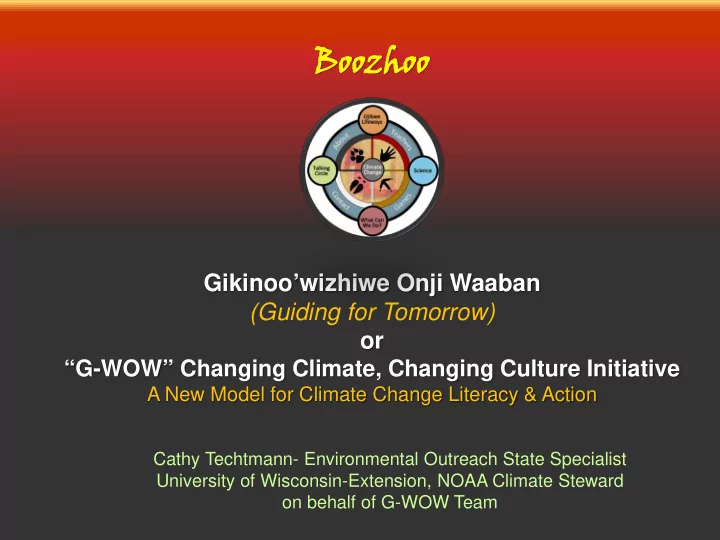

Boozh oozhoo o Gikinoo’wizhiwe Onji Waaban (Guiding for Tomorrow) or “G-WOW” Changing Climate, Changing Culture Initiative A New Model for Climate Change Literacy & Action Cathy Techtmann- Environmental Outreach State Specialist University of Wisconsin-Extension, NOAA Climate Steward on behalf of G-WOW Team
G-WOW Team Partners Funding Provided by :
Additional technical support and resources Wisconsin climate science research, mapping tools Climate science for northern Wisconsin forests Multi-cultural place-based stories of climate change
Project Location: In the heart of the Lake Superior Ojibwe Country, based at the Northern Great Lakes Visitor Center Ashland, WI This region includes 11 Ojibwe Tribes living within the “Ceded Territory” of northern WI, MN, and MI. Applicable to other locations & cultures
G-WOW Roots (2007) Increasing evidence that climate change is affecting the • sustainability of Lake Superior coastal resources, communities, and cultures Concern about climate change impacts to Ojibwe treaty rights • and traditional cultural practices within the Ceded Territory “Traditional” climate literacy models were not resonating with • audiences Diverse project partners came together as the G-WOW Team to develop a new climate change educational outreach strategy
Culture Informing Science “… local, place-based evidence of climate change gained through experiential learning is as, or more effective than, simply studying analytical climate change data to increasing climate change literacy.” “The Psychology of Climate Change Communication”, Columbia University 2009
The Lake Superior Ojibwe have relied on the sustainability of key plant and animal species for generations to support subsistence, cultural, and spiritual practices or “lifeways” Their traditional ecological knowledge (TEK) of natural systems provides place-based indicators of climate change for people of all cultures
G-WOW Key Principles • Climate change is real Harvesting birch bark- a boreal species that relies on a cool • Humans contribute to climate change climate • Weather and climate are different • Climate affects culture • We can make a difference! Projected change in Wisconsin’s annual average temperatures in ºF 1980-2055
Why Is the G-WOW Model Unique? It based on evaluating climate change impacts on the habitat conditions needed for the sustainability of plant or animal species that support a cultural practice through integration of place-based with scientific evidence • Creates a culturally relevant climate change perspective • Links cultural, place-based evidence with scientific climate research • Makes the model transferrable to other cultures • Promotes action through service learning The G-WOW model uses impacts on Ojibwe cultural practices as an indicator of a changing climate for all cultures
Appling G-WOW model: Wild Ricing Manoomin (wild rice) is a key species to the Ojibwe for subsistence, spiritual, and ceremonial purposes. The Ojibwe lifeway of wild rice harvesting depends on the sustainability of manoomin. The sustainability of manoomin depends on habitats with: • shallow water • moderate water level fluctuations • cool growing season temperatures
Is there place-based evidence of climate change impacts on manoomin? 2007 - 2012: Unprecedented disruptions in tribal wild rice harvests and yields due to drought, fungal disease, storms Is there scientific evidence that climate change will affect manoomin? HEAT DROUGH GUSHER T S Frequency of 90-degree days Change in frequency of 2” + Annual average temperatures in ºF, 1980-2055 precip
Example: G-WOW application Cultural Practice Key Species Place-based & Scientific Evidence Requires cool moist forest habitats, cold winters for sugar production Projected frequency of days over 90-degrees F, 1980-2055 What does this mean for sustainability of sugar maple trees? Cultural practices & businesses that rely on sugar maple?
Example: G-WOW application Cultural Practice Key Species Place-based and Scientific Evidence Requires cold water habitats with high oxygen levels Projected change in Wisconsin’s annual average summer temperatures in ºF, 1980-2055 Climate models predict up to 95% of Wisconsin’s brook trout habitat across could be lost if the average annual summer air temperature increased just over 5 º F.
Example: applying the G-WOW model to a “non-species” dependent cultural practice Cultural Practice Key “condition” Place-based and Scientific Evidence What do these changes mean for species and cultural practices and species that Projected change in Wisconsin’s depend on winter average temperatures in cold and snow? ºF, 1980-2055
G-WOW SERVICE LEARNING CURRICULUM www.g-wow.org Ojibwe Lifeways- Connect With Culture Place-based evidence of climate impacts on 4- seasonal Ojibwe cultural Talking Circle practices and the key Sharing climate species supporting them service learning projects and Investigate the results Science Integration of climate science with place- based evidence to evaluate if culture and science agree. What Can We Do? Taking action through climate service learning projects
G-WOW Outreach Tools Cultural Connection: Ojibwe Web Curriculum language, www.g-wow.org TEK, and cultural elements infused Climate Change Integration of Discovery Center Educator Training climate Institutes science Taking action on climate change and sharing results
TARGET AUDIENCES Learners (middle school & above) Teachers-Educators General Public
We invite you to use and expand the G-WOW model to increase climate change literacy based on the unique lifeways of your culture www.g-wow.org
On Be Behalf of of th the G G-WOW W Tea eam Miigwe gwech ! For more information, please contact Cathy Techtmann-Environmental Outreach Specialist University of Wisconsin-Extension 715.561.2695 catherine.techtmann@ces.uwex.edu http://fyi uwex edu/nglvc/
Recommend
More recommend